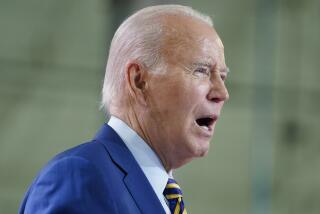Baucus offers higher subsidies, other changes to his healthcare bill
- Share via
WASHINGTON — In a bid to attract liberals and unify Democrats on his healthcare overhaul bill, Senate Finance Committee Chairman Max Baucus (D-Mont.) on Tuesday proposed to boost subsidies for financially strapped people who would be required to buy insurance.
He also slashed proposed penalties for those who did not comply with the insurance mandate and sought to limit how many people would be subject to a new excise tax on high-end -- or so-called Cadillac -- health plans.
Baucus’ proposals came on the first day that his committee began reworking his long-awaited blueprint.
His initial proposal faced a barrage of criticism from Democrats and from the only Republican senator sympathetic to the bill, who said that families of moderate means would not be able to afford the bill’s mandate that almost everyone have health insurance.
Baucus’ quick response was a sign of the growing pressure on him to move to the left now that hope of winning significant GOP support has all but evaporated.
The finance committee is also under time pressure, because Democratic leaders must still meld the panel’s version of healthcare legislation with a more liberal bill produced earlier this summer by the Senate Health Committee.
On Tuesday, Baucus’ changes drew praise from some Democrats and from Sen. Olympia J. Snowe (R-Maine).
“This is a solid starting point, but we are far from the finish line,” said Snowe, whose support is being courted heavily by Baucus and the White House.
Most Republicans, meanwhile, continued to lambaste the Democratic effort.
“As this bill moves across the [Senate] floor, I am concerned that it will not move more in the direction of more choice and lower cost, but one that will lurch to the left and result in higher cost and less choice for the American people,” said Sen. John Cornyn (R-Texas).
The precise cost of the revised bill was not immediately available, but Baucus said it would be near or below the $900-billion, 10-year target set by President Obama.
Baucus announced the following major revisions:
* Easing the financial burden on families with income up to four times the federal poverty level (about $88,000 a year for a family of four). In his original proposal, people making between 133% and 400% of the federal poverty level could have been required to pay 3% to 13% of their income for insurance; the new proposal would lower that scale to between 2% and 12%. Americans making less than 133% of the federal poverty level would qualify for Medicaid.
* Dropping the maximum penalty for failing to comply with the mandate to get insurance from $3,800 per family to $1,900 per family.
* Revising terms of an excise tax intended to help pay for the healthcare overhaul and help control costs, exempting policies that cover high-risk workers like firefighters and coal miners but increasing the tax rate from 35% to 40%.
* Making insurance more affordable for seniors by limiting how much more insurers can charge older customers compared with younger ones.
* Allaying fears that fiscally strained states would get stuck with a larger healthcare bill, by having the federal government cover the full cost of expanding Medicaid in states with large Medicaid populations and fast-rising unemployment, such as California and Michigan.
--
noam.levey@latimes.com
More to Read
Get the L.A. Times Politics newsletter
Deeply reported insights into legislation, politics and policy from Sacramento, Washington and beyond. In your inbox twice per week.
You may occasionally receive promotional content from the Los Angeles Times.











